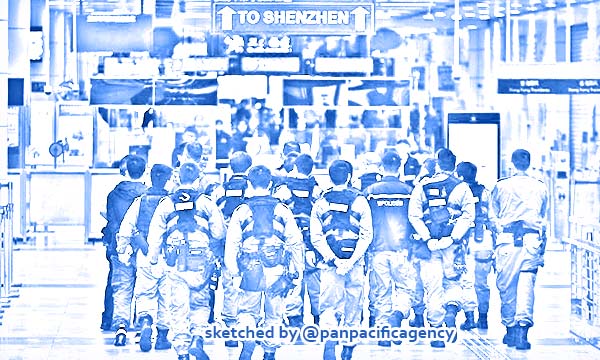China targets travellers at its borders in strategy change to stop coronavirus spread

Hong Kong police at the Shenzhen Bay Port border crossing wear masks as a preventative measure against the coronavirus. Photo: Philip Fong / AFP. Sketched by the Pan Pacific Agency.
BEIJING, Mar 1, 2020, SCMP. China will step up monitoring of the health of travellers entering and leaving the country in a change of strategy to stop the international spread of the coronavirus as the number of cases in other countries surges, the central government said on Sunday, South China Morning Post reported.
With the number of new domestic cases falling, the announcement indicates a widening in Beijing’s anti-virus strategy to include a focus on preventing contagion between countries.
The foreign ministry also announced that, if necessary, China would repatriate citizens in countries seriously affected by Covid-19, the illness caused by the coronavirus.
The reports came as new coronavirus cases in China continued to slow, while infections in other countries rose sharply, raising concerns about a possible worldwide pandemic.
New South Korean cases exceeded those in China for a third straight day and included a 45-day-old boy.
In addition, Beijing and Tokyo are considering postponing Chinese President Xi Jinping’s state visit to Japan now scheduled for April until the autumn because of concerns about the spread of the coronavirus, Japanese media reported on Sunday, citing diplomatic sources in both countries.
In response to the rising threat from the spread of the virus overseas, all travellers who enter or leave China will now have to fill out a detailed health declaration.
Lin Wei, an official in charge of health and quarantine at the General Administration of Customs, said officers would scrutinise health declarations and whether visitors showed any symptoms or had been to an outbreak area in the previous 14 days.
“We are adopting strict scientific border control measures in accordance with the law to prevent [the coronavirus] from being spread in or out of the country. We will resolutely curb the spread of the epidemic through ports of entry,” Lin said.
The number of new coronavirus cases in China has gradually declined over the last 10 days, with only three new confirmed cases on Sunday outside Hubei province, the epicentre of the epidemic, the lowest level since January 23. The mainland has reported nearly 80,000 cases with 2,870 deaths from Covid-19.
But other countries have had a rapid rise in new cases. South Korea reported 586 new cases on Sunday, bringing the total number of infections to nearly 3,800. Italy reported more than 1,100 cases with 29 deaths, while Iran reported nearly 1,000 cases with 54 deaths, the most outside China.
Lin said all visitors who passed through customs would have their health form checked, their temperatures taken twice and their travel history examined.
Those who show symptoms, come from countries or areas with serious outbreaks or have been in close contact with confirmed or suspected virus cases will be subject to strict medical examinations and possibly laboratory tests.
Lin said any person confirmed with or suspected of having the disease, anybody who had close contact with confirmed cases and any passenger with symptoms would be isolated for medical observation.
The National Immigration Administration’s (NIA) top priority was to stop contagion from overseas epidemic sources and it had stepped up efforts to prevent “imported infections”, said Liu Haitao, an NIA official in charge of border control.
The NIA will report passengers coming from countries and areas with serious coronavirus outbreaks to customs officials. They will also notify relevant authorities at their port of arrival to undertake specific epidemic prevention measures for these passengers.
Some cities, such as Yantai and Weihai in Shandong province, are also applying broad screening of passengers arriving from overseas. Yantai is carrying out nucleic acid tests for the virus on all incoming passengers, while Weihai will pay for travellers from Japan and South Korea to stay in hotels for 14 days of quarantine.
Liu said the number of passengers from South Korea had increased “slightly” to about 1,300 people a day recently, but 70 per cent of them were Chinese nationals returning home.
Additional reporting by Reuters